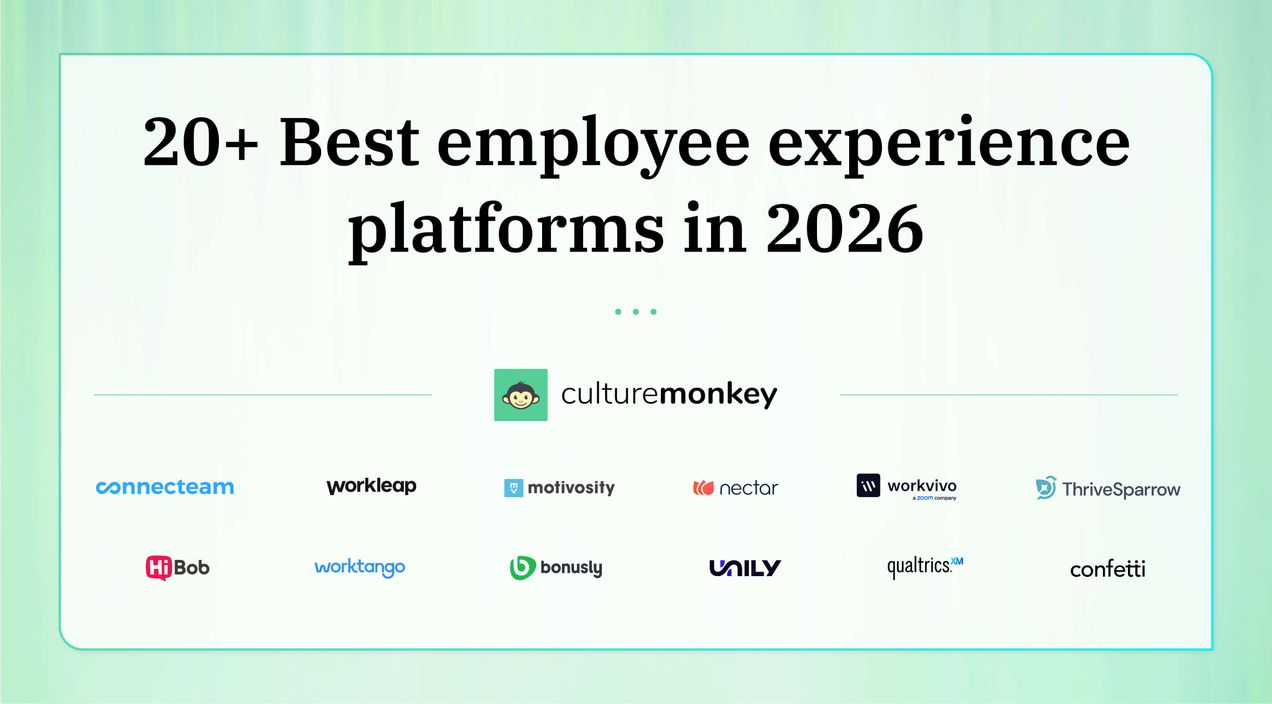20 Problems with Gen Z in the workplace: Understanding what motivates them

Picture a bustling office filled with the clickety-clack of keyboards, the hum of conversations, and the occasional ping of incoming emails. Amidst the sea of professionals, a new wave of leaders is rising, bringing fresh perspectives and an entirely different approach to work.
They are Generation Z, the digital natives born between the mid-1990s and early 2000s, and they are transforming the workplace landscape like never before.
Over the past few years, and since the onset of the global pandemic, the workplace has changed. Gen Z is projected to make up 27% of the global workforce by 2025 and has disrupted the status quo. With their unparalleled technological prowess and unique set of values, they bring both excitement and challenges to the workplace.
As employers, managers, business leaders, and colleagues strive to understand and adapt to their distinctive traits, a new set of questions arises: What are the problems faced by Gen Z in the workplace? How can we bridge the gap and create a harmonious work environment that nurtures their potential?
In this blog, we will dive deep into the multifaceted challenges encountered by employers when integrating Gen Zers into the workforce.

See how Gen-Z employee feedback survey would look like in CultureMonkey's employee survey tool.
Who are Gen Z employees?
Well, this term refers to employees who belong to Generation Z, also known as Gen Z or the iGeneration. They are the demographic cohort born between the mid-1990s and early 2000s, following Generation Y (Millennials) and preceding Generation Alpha. As the first generation of young people to have grown up entirely in the digital age, they are often referred to as “digital natives.”
These employees have distinct characteristics shaped by their experiences and upbringing. They have been exposed to advanced technology from an early age, leading to strong digital literacy skills and a natural affinity for digital platforms and communication tools. They are highly connected, social, and accustomed to instant access to information.
This new generation of workers is known for its diversity, both in terms of ethnicity and viewpoints. In addition to its diversity in terms of ethnicity and viewpoints, these young employees also differ from other older generations in their digital fluency, entrepreneurial mindset, and a strong emphasis on social justice and inclusion.
In addition to its diversity in terms of ethnicity and viewpoints, this younger generation of employees differ from other previous generations of leaders in the company in some ways.

Professional development and a clear career growth path is key to them even before joining the organization. - Angela Cheng-Cimini, CHRO, Harvard Business Publishing
Key characteristics of Gen Z in the workplace
Gen Z in the workplace brings a fresh perspective, redefining how organizations function and engage with employees. However, adapting to their expectations requires an understanding of their unique traits, as well as strategies for how to deal with Gen Z at work while addressing Gen Z challenges in the workplace.
- Tech-savvy and digital-first mindset: Growing up with technology, Gen Z prefers AI-driven tools, instant messaging, and collaborative software, but this can sometimes lead to Gen Z workplace issues like digital overload and reduced face-to-face interactions.
- Prioritizes work-life balance: Unlike previous generations, Gen Z values flexible schedules, mental health support, and purpose-driven careers. Ignoring these needs can lead to Gen Z employment issues, including higher turnover rates.
- Seeks frequent feedback and recognition: Gen Z craves real-time feedback and validation, making traditional annual reviews ineffective. Organizations that fail to adapt may face Gen Z issues in the workplace, such as disengagement and lack of motivation.
- Prefers meaningful work over stability: Unlike older generations, Gen Z prioritizes mission-driven roles and career growth over long-term job security. Companies struggling with Gen Z challenges in the workplace must align roles with personal values to retain talent.
- Values diversity and inclusivity: Gen Z expects workplaces to be inclusive and ethical. Failing to address these concerns may contribute to Gen Z workplace issues, such as resistance to traditional corporate structures.
- Struggles with attention span and job-hopping tendencies: One of the negative characteristics of Gen Z is their tendency to seek frequent job changes. Businesses working with Gen Z must create engaging environments and career growth opportunities to improve retention.
How are Gen Z employees different from other generations?
These employees differ from other generations in several key ways. They are the first truly digital-native gen, having grown up immersed in technology and social media. They possess strong digital skills and are comfortable navigating online platforms. Employees from Gen Z value diversity, inclusion, and social justice, and they actively seek out workplaces that align with their values.
They crave authentic and personalized experiences and prefer instant and constant feedback. Gen Z also tends to have a more entrepreneurial mindset, seeking opportunities for growth and impact. Understanding these unique characteristics is vital for organizations to engage and retain Gen Z talent effectively.

Gen-Zs have really helped normalize conversations about mental health and overall work-life experience and their general activism, I think, has gone a long way to challenge the status quo, especially around issues like valuing difference and inclusion - Danna M Brown, Head of people & Culture, Electriphi
How will Gen Z affect the workplace?
Gen Z is poised to have a significant impact on the workplace. As digital natives, they bring advanced technological skills and a fresh perspective on collaboration and communication. Gen Z's emphasis on work life balance and their desire for meaningful work aligns with the growing demand for flexible and purpose-driven workplaces.
They are likely to challenge traditional hierarchies and advocate for diversity, equity, and inclusion. Gen Z's entrepreneurial mindset may lead to innovative thinking and a drive for continuous learning. Adapting to Gen Z's preferences and harnessing their potential can contribute to a more dynamic, inclusive, and forward-thinking work environment.
Gen Z vs millennials at work
| Aspect | Gen Z in the workforce | Millennials characteristics at work |
|---|---|---|
| Work motivation | Driven by purpose and values, seeking meaningful work that aligns with social causes. | Motivated by career growth and personal development, valuing mentorship roles. |
| Work ethic | Gen Z work ethic is shaped by efficiency and digital fluency, preferring results over long hours. | Millennials characteristics at work include dedication, teamwork, and willingness to put in extra hours. |
| Preferred communication style | Prefers quick, digital-first communication via instant messaging, avoiding lengthy emails or calls. | Values both digital and face-to-face interactions, balancing emails, calls, and meetings. |
| Work-life balance | Prioritizes flexibility and mental health, demanding strong generation z work life balance policies. | Strives for work-life balance but is more willing to compromise for career advancement. |
| Job loyalty | More likely to job-hop if their needs are not met, leading to Gen Z problems in retention. | Tends to be more loyal to employers if provided with career progression and learning opportunities. |
| Technology adaptation | Highly tech-savvy, easily adapting to AI-driven tools, automation, and digital workflows. | Comfortable with technology but may require more time adapting to emerging AI and automation trends. |
What are the problems of Gen Z employees?

1. Communication preferences
Gen Z tends to favor digital communication platforms, such as instant messaging and social media, which can differ from traditional workplace communication methods. This can create a disconnect and miscommunication between older generations and colleagues who prefer more face-to-face or phone interactions.
2. Work and life balance expectations
Members of this group place a strong emphasis on work and life balance and prioritizing personal well-being. They seek flexibility in their work arrangements and value time off and leisure activities. Balancing their desire for a fulfilling personal life with the demands of the job can be a challenge. These young people see the impact of work-related burnout and more overall stress, and seek more balanced working structures.
3. Career advancement, job opportunities, job security
With a strong desire for growth and development in careers, Gen Z may become frustrated if they perceive limited opportunities for career development and advancement in the workplace. They value continuous learning, research and education and desire clear paths for progression. They value clear expectations of how they can grow.
4. Traditional work structures
This new age of employees often have a different perspective on workplace hierarchy and may prefer a more collaborative and inclusive environment. They may challenge traditional company top structures and seek opportunities for active participation and contribution.
5. Mental health awareness of the employer
In addition to the above, mental health is a prominent concern as they navigate the pressures of modern work environments. Additionally, the younger employees may experience physical health issues due to sedentary work lifestyles and increased reliance on technology.
Some experts attribute their behavior to the Great Recession; a period when many Gen Z individuals were still in their formative years or entering the workforce. While not directly experiencing the full brunt of the recession, they were influenced by its aftermath.
It is essential to address these challenges and provide support for their mental health and physical well-being. Despite these challenges, these employees often bring a positive life outlook and fresh perspectives, contributing valuable insights to the workplace that can benefit both their own generation and any other generation.
6. Immediate gratification vs Perseverance puzzle
Raised in the age of instant gratification, Gen Z's thirst for swift results encounters the labyrinthine journey of career progression. The conundrum lies in cultivating the virtue of patience amidst a landscape that thrives on enduring dedication and incremental growth.
7. The feedback quandary and skill elevation
An insatiable appetite for real-time feedback is a hallmark of Gen Z, but when met with workplaces that offer delayed assessments, the journey to continuous skill enhancement becomes a puzzle they must solve.
8. Navigating mentorship gaps in dynamic sectors:
The rapidly evolving industries employers that mentor Gen Z often ventures into can leave them yearning for experienced mentors who can guide them through uncharted waters, impacting their growth trajectory.
9. Diversity dreams and inclusivity realities:
Gen Z champions diversity and inclusivity, and when their workplace fails to mirror these values, their engagement and motivation can suffer, calling for a reimagining of organizational culture.
10. Dancing with job insecurity in the gig economy:
The gig economy's allure of flexibility may clash with Gen Z's desire for stability and career advancement, demanding a unique set of strategies to navigate this terrain.
11. Technology dependency and adaptation challenges:
While Gen Z is often viewed as tech-savvy, their heavy reliance on technology can pose challenges in adapting to environments where technology is limited or where different systems are in place.
12. Balancing ambition with realistic expectations:
As ambitious individuals, Gen Z often sets high career goals for themselves. However, balancing these aspirations with the reality of entry-level positions and the time it takes to climb the corporate ladder can lead to frustration and disillusionment if not managed effectively.
13. Desire for purpose-driven work:
Many Gen Z employees prioritize working for companies that align with their values and contribute positively to society. When they feel disconnected from the purpose of their work or perceive their employer's values as misaligned with their own, it can lead to decreased job satisfaction and motivation.
14. Financial literacy and planning:
Despite being technologically adept, Gen Z may lack essential financial literacy skills, such as budgeting, saving, and investing. Without proper guidance and education in this area, they may struggle to manage their finances effectively, especially as they navigate the complexities of student loans, credit cards, and other financial responsibilities such as budgeting.
15. Managing distractions and maintaining focus:
In an era filled with constant notifications, social media updates, and digital distractions, Gen Z employees may find it challenging to maintain focus and productivity in the workplace. Learning effective time management strategies and cultivating the discipline to minimize distractions can be crucial for their success.
16. Struggles with constructive criticism
Gen Z employees often seek frequent real-time feedback, but they may struggle with receiving constructive criticism, especially when delivered in a traditional corporate setting. Employers need to balance encouragement with areas for improvement to foster growth without discouragement.
17. Expectation for rapid career growth
Many Gen Z workers expect fast promotions and career advancements, sometimes underestimating the time and effort required to develop leadership skills. Managing these expectations while providing a clear career path is essential for long-term retention.
18. Workplace loyalty concerns
Job-hopping is common among Gen Z due to a desire for purpose-driven work and career flexibility. Organizations face challenges in retaining Gen Z employees and must create engaging opportunities to increase workplace loyalty.
19. Adapting to corporate etiquette
Having grown up in a casual, digital-first culture, Gen Z may struggle with traditional workplace etiquette, such as formal communication, professional dress codes, and hierarchical structures. Bridging this gap requires clear expectations and adaptability from both employers and employees.
20. Unrealistic salary expectations
With rising living costs and financial concerns, Gen Z employees may expect higher starting salaries, sometimes misaligned with market realities. Transparent salary structures and financial literacy programs can help them understand long-term financial planning and compensation growth.
Understanding these challenges and adapting work practices to address them can help organizations create a more supportive and engaging environment for Gen Zers.
What motivates Gen Z in the workplace?

The average gen Z employee is motivated by various factors in the workplace. Some key motivators for include:
1. Purpose and meaning
Gen Z seeks work that aligns with their values and provides a sense of purpose. They are motivated by opportunities to make a positive impact on society and contribute to causes they care about.
For example, the younger generation of employees gravitate towards companies that demonstrate their commitment to a broader set of societal and world challenges such as sustainability, climate change, and hunger.
2. Career growth and learning opportunities
Gen Z values continuous learning and seeks workplaces that offer opportunities for professional development and skill enhancement. They are motivated by clear paths in careers, mentorship programs, and chances to acquire new knowledge and skills.
3. Work-life balance
They value flexibility in work arrangements, with benefits such as remote work options or flexible hours, as well benefits such as time for personal interests, hobbies, mental health, and family.
4. Inclusion and diversity
Gen Z values workplaces that foster inclusivity, diversity, and equality. They are motivated by environments where they feel respected, valued, and included, regardless of their background or identity.
5. Recognition and feedback
Gen Z craves regular feedback and recognition for their work. They appreciate frequent check-ins with managers and constructive feedback to help them improve and grow. Organizations that do not provide adequate feedback mechanisms may struggle to engage and retain Gen Z talent.
6. Purpose-driven passions
Gen Z is fueled by purpose. Beyond a paycheck, they seek roles that resonate with their values and contribute to societal betterment. Organizations that align their mission with Gen Z's sense of purpose are poised to cultivate a motivated workforce, eager to invest their energy in meaningful endeavors.
7. Collaborative engagement
Gen Z thrives in collaborative ecosystems where their ideas are valued. Open avenues for participation and innovation invigorate their sense of belonging, igniting a motivational fire that propels them to contribute their best.
8. Embrace of technology
Gen Z's innate affinity for technology merges seamlessly with a workplace that fosters a tech-driven environment. Access to cutting-edge tools and opportunities to leverage their digital prowess cultivates a sense of relevance and fuels their motivation.
9. Entrepreneurial opportunities
Gen Z possesses an entrepreneurial spirit. Organizations that nurture innovation and intrapreneurial endeavors provide an outlet for their creative energy, kindling motivation by enabling them to shape the company's trajectory.
10. Impactful work
Gen Z craves to see the tangible outcomes of their efforts. When they can connect their tasks to broader outcomes and witness their impact, their motivation swells, propelling them to invest wholeheartedly in their roles.
11. Transparent communication
Transparent communication channels and authentic leadership resonate deeply with Gen Z. They value honesty and openness from their employers, appreciating when goals, expectations, and challenges are clearly communicated.
12. Flexibility in career paths
Gen Z embraces the idea of nonlinear career paths. They are motivated by workplaces that offer flexibility in career progression, allowing them to explore diverse roles and opportunities within the organization.
13. Social responsibility initiatives
Gen Z is drawn to companies that prioritize social responsibility and sustainability. They are motivated by initiatives that demonstrate a commitment to environmental stewardship, ethical business practices, and community engagement.
14. Work culture alignment
Gen Z values a positive and inclusive work culture. They are motivated by workplaces that prioritize employee well-being, foster a sense of belonging, and celebrate diversity. A supportive work culture that encourages collaboration, creativity, and mutual respect enhances their job satisfaction and commitment to the organization.
15. Opportunities for self-expression and creativity
Gen Z craves opportunities for self-expression and creativity in the workplace. They are motivated by environments that encourage innovation, experimentation, and out-of-the-box thinking.
16. Personalized development plans
Gen Z values personalized development plans tailored to their individual strengths, interests, and career goals. They are motivated by employers who invest in their growth through personalized training, coaching, and mentorship opportunities.
17. Recognition of work-life integration
Gen Z seeks employers who recognize and support work-life integration, acknowledging that personal and professional lives often intertwine. They are motivated by workplaces that offer policies and benefits accommodating their diverse needs, such as parental leave, flexible scheduling, and wellness programs.
10 Negative characteristics of Gen Z employees in the workplace

While they are often praised for their digital fluency, adaptability, and passion for social causes, there are also negative characteristics that some Gen Z employees may exhibit in professional settings. Understanding these traits can help employers navigate the complexities of managing a multigenerational workforce effectively.
- Short attention span: Due to their exposure to constant stimuli and information overload, some Gen Z employees may struggle with maintaining focus on tasks for extended periods.
- Dependence on technology: While tech-savvy, Gen Z's heavy reliance on technology can sometimes lead to difficulties in adapting to environments where technology is limited or different systems are in place.
- Desire for instant gratification: Raised in an era of instant access to information and services, some Gen Z employees may struggle with patience and persistence in achieving long-term goals, preferring immediate results.
- Difficulty with face-to-face communication: Gen Z's preference for digital communication platforms may result in challenges when it comes to effective face-to-face communication and building interpersonal relationships in the workplace.
- Unrealistic career expectations: Some Gen Z employees may have overly ambitious career expectations, leading to dissatisfaction and disengagement when they encounter the realities of entry-level positions and the time it takes to climb the corporate ladder.
- Impatience with traditional work structures: Gen Z's desire for a more flexible and inclusive work environment may clash with traditional workplace hierarchies and processes, leading to tension and resistance to established norms.
- Lack of financial literacy: Despite their technological prowess, many Gen Z employees may lack essential financial literacy skills, such as budgeting and investing, which can impact their ability to manage their finances effectively and plan for the future.
- Over-reliance on feedback: While craving feedback is often seen as positive, some Gen Z employees may become overly dependent on constant reassurance and validation, leading to insecurity and self-doubt in the absence of immediate feedback.
- Disdain for repetitive tasks: Gen Z employees may struggle with repetitive tasks or routine responsibilities, seeking novelty and variety in their work assignments to stay engaged and motivated.
- Difficulty with resilience: Growing up in a time of economic uncertainty and rapid change, some Gen Z employees may exhibit lower levels of resilience and perseverance in the face of challenges or setbacks, potentially impacting their ability to bounce back from adversity in the workplace.
How to communicate with Gen Z in the workplace?
Effective communication is key to working with Gen Z and ensuring they feel valued and engaged. While Gen Z employees are highly connected, their digital-first communication style can sometimes lead to Gen Z communication problems and Gen Z issues in the workplace if not managed properly.
- Use digital communication tools effectively: Gen Z in the workplace prefers quick, informal communication through Slack, Teams, and WhatsApp. Relying solely on emails can feel outdated and slow for Generation Z professionals.
- Keep feedback real-time and constructive: One of the 10 negative characteristics of Gen Z is their need for instant gratification, making delayed feedback frustrating. Regular check-ins help manage Gen Z challenges in the workplace and keep them engaged.
- Encourage open and inclusive dialogue: Gen Z workplace issues include a strong desire for transparency. They expect open discussions about company culture rather than rigid corporate messaging.
- Balance digital and face-to-face interactions: Gen Z employment issues arise when reliance on digital conversations weakens in-person communication skills. Encouraging both formats improves workplace collaboration.
- Be clear, direct, and authentic: Who is Gen Z? They value honesty and straightforward messaging. Avoid overly formal or vague communication, which often leads to Gen Z workplace issues.
- Recognize communication differences across generations: Understanding how to deal with Gen Z at work means adapting messaging styles and fostering mutual respect across age groups.
By refining workplace communication, companies can minimize Gen Z challenges in the workplace and build an engaging, transparent, and productive environment for Generation Z employees.
How to deal with Gen Z in the workplace?

To effectively deal with problems with Gen Z in the workplace now, consider the following strategies:
1. Embrace technology
Gen Z is tech-savvy, so provide them with the latest tools and technologies to enhance their productivity and collaboration. Leverage digital platforms for communication, project management, and knowledge sharing.
2. Foster a flexible work environment
Gen Z values work-life balance. Offer flexible work arrangements, such as remote work options or flexible hours, to accommodate their needs and promote healthy work-life integration.
3. Provide clear growth opportunities
Gen Z seeks continuous learning and career advancement. Offer mentorship programs, training opportunities, and clear career progression paths to support their professional development and help them see a future within the organization.
4. Cultivate a diverse and inclusive culture
Create an environment that celebrates diversity and fosters inclusion. Encourage diverse perspectives and ensure everyone feels valued and respected. Implement inclusive policies and practices that address the needs of all employees.
5. Offer regular feedback and recognition
Gen Z craves feedback and appreciates recognition. Provide timely and constructive feedback to help them improve. Implement recognition programs that acknowledge their accomplishments and contributions.
6. Encourage collaboration and teamwork
Gen Z values collaboration and enjoys working in teams. Create opportunities for them to collaborate on projects, engage in cross-functional teams, and share their ideas and insights.
7. Emphasize purpose-driven work
Gen Z is motivated by meaningful work. Connect their roles to the organization's mission and purpose. Clearly communicate how their work contributes to larger goals and societal impact.
8. Encourage work-life blend
Instead of strict separation, support a work-life blend where personal and professional lives coexist harmoniously. Promote self-care, and mental and physical health issues, and well-being, and healthy work-life integration.
9. Fostering innovation
Gen Z embodies an entrepreneurial spirit. Encourage innovative thinking, allowing them to propose and implement new ideas, thereby tapping into their creative reservoir and amplifying their engagement.
10. Showcasing impact
Gen Z craves meaningful contributions. Articulate how their work directly influences the company's success, connecting the dots between their efforts and tangible outcomes to elevate their motivation.
By understanding and adapting to the needs and preferences of Gen Z workers, organizations can create a positive and engaging work environment that maximizes their potential and fosters their long-term commitment.
By understanding and adapting to the needs and preferences of Gen Z workers, organizations can create a positive and engaging work environment that maximizes their potential and fosters their long-term commitment.
How to make Gen Z workers feel at home at your workplace?

To make these young workers feel at home in your workplace, it is important to create an environment that aligns with their values and preferences. Embrace their technological skills by providing them with cutting-edge tools and digital platforms that facilitate efficient communication and collaboration.
Foster a flexible work culture that accommodates their desire for work balance and autonomy. Cultivate a diverse and inclusive environment where all employees feel valued and respected. Provide avenues for growth and development, such as mentoring programs and training opportunities, to support their continuous learning.
Incorporate social impact initiatives that allow them to contribute to meaningful causes. Foster a collaborative and team-oriented atmosphere that encourages cross-functional collaboration.
Gen Z team members are inherently purpose-driven. To create an atmosphere that embraces them, it's paramount to spotlight the alignment of your company's mission with their core values. Showcase how their individual contributions contribute to a larger, meaningful impact, underscoring the significance of their roles within the grand narrative of the organization.
The digital realm is Gen Z's native habitat. Equip them with cutting-edge tools and technologies that streamline workflows and enhance productivity. This not only showcases your commitment to their comfort but also harnesses their technological acumen, driving their enthusiasm to new heights.
Gen Z thrives on witnessing the results of their efforts. Illustrate how their work directly contributes to the organization's success. By demonstrating the tangible outcomes of their contributions, you validate their significance and deepen their motivation to excel.
By implementing these strategies, you can create a workplace where every members of Gen Z feels comfortable, engaged, and motivated to thrive.
10 Gen Z workforce statistics that you should know

The contemporary workforce is in the midst of a transformative shift, as the Generation Z (Gen Z) cohort steps into the limelight. Armed with a distinct digital fluency and a unique set of values, Gen Zers ranked empathy and are redefining the dynamics of the modern workplace.
Let's embark on a statistical expedition, to unravel ten compelling Gen Z workforce statistics that illuminate the path to understanding and engaging this burgeoning talent pool.
1. Digital natives in the spotlight:
Gen Z constitutes 27% of the global population, making them the largest segment of digital natives in history. (Source: World Economic Forum)
2. A multiscreen generation:
A staggering 98% of Gen Z individuals own a smartphone, while 72% use more than one device at a time. (Source: Pew Research Center)
3. The entrepreneurial drive:
Gen Z displays a remarkable entrepreneurial spirit, with 41% of them aiming to start their own businesses. (Source: Millennial Branding)
4. Embracing diversity and inclusion:
A remarkable 77% of Gen Z believes that a company's level of diversity influences their decision to work there. (Source: Glassdoor)
5. Digital content consumers:
Gen Z spends an average of 10 hours per day consuming digital content, emphasizing the importance of a strong online presence for businesses targeting this demographic. (Source: Kantar Millward Brown)
6. Work-life balance advocates:
81% of Gen Z considers work-life balance as a top priority when evaluating job opportunities, emphasizing the significance of flexible work arrangements. (Source: Robert Half)
7. Visual communication pioneers:
More than 70% of Gen Z prefers visual platforms like YouTube and Instagram for communication, impacting how organizations engage and market to this generation. (Source: Center for Generational Kinetics)
8. Learning enthusiasts:
Gen Z exhibits a thirst for learning, with 76% stating they prefer to learn through YouTube videos, demonstrating the value of incorporating visual learning into corporate training. (Source: Pearson)
9. Socially conscious contributors:
A striking 94% of Gen Z believes companies should address social and environmental issues, paving the way for purpose-driven organizational initiatives. (Source: McKinsey & Company)
10. Tech-savvy job seekers:
Gen Z job seekers prioritize companies that adopt cutting-edge technologies, with 39% considering the level of technology usage as a critical factor in their job search. (Source: Monster)
How to curate work-life balance practices for Gen Z employees?

In the ever-evolving landscape of the modern workforce, Generation Z (Gen Z) employees emerge as a vibrant force, bringing with them a unique blend of digital fluency, creativity, and a profound desire for work-life balance. Curating an environment that harmoniously intertwines their professional aspirations with personal well-being is pivotal for organizational success.
Let's embark on a strategic journey to unveil a comprehensive roadmap for crafting work-life balance practices that resonate with Gen Z employees.
Define a clear boundaries blueprint:
Establish distinct boundaries between work and personal life by setting clear expectations for working hours, breaks, and response times. Encourage Gen Z employees to switch off notifications after work hours to enable them to unwind and recharge.
Leverage technology mindfully:
Promote digital well-being by advocating regular technology detoxes. Encourage Gen Z to unplug during breaks and utilize apps designed to track screen time, ensuring a healthy balance between digital engagement and relaxation.
Prioritize health and wellness:
Integrate wellness initiatives such as yoga classes, meditation sessions, and wellness challenges into the workplace routine. Gen Z employees highly value physical and mental well-being, and these offerings foster a holistic approach to work-life balance.
Encourage regular breaks:
Emphasize the importance of taking short, rejuvenating breaks throughout the workday. Encourage Gen Z employees to step away from their screens, stretch, and engage in mindfulness exercises to boost productivity and well-being.
Implement result-oriented approach:
Focus on outcomes rather than micromanaging processes. Empower Gen Z employees to take ownership of their tasks and manage their time effectively, enabling them to achieve their goals while maintaining work-life equilibrium.
Embrace remote work policies
Capitalize on Gen Z's affinity for remote work by implementing comprehensive remote work policies. Providing the option to work from home allows them to curate their ideal work environment and strike a balance between personal and professional commitments.
Cultivate regular check-ins:
Foster open communication by scheduling regular one-on-one check-ins. Create a safe space for Gen Z employees to discuss their workload, challenges, and personal needs, ensuring their well-being remains a top priority.
Lead by example :
Cultivate a culture of work-life balance starting from the top. Demonstrate the importance of prioritizing well-being by promoting your own balance and encouraging managers to champion a healthy equilibrium between work and personal life.
Nurturing work-life balance practices for Gen Z employees requires a deliberate and strategic approach. By setting clear boundaries, embracing flexibility, and fostering a culture of well-being, organizations can create an environment where Gen Z thrives both professionally and personally.
What is the future of employee engagement with the advent of newer generations and young workers?

The future of employee engagement with the advent of newer generations holds exciting possibilities! As younger generations, such as Gen Zers, step into the workforce, the landscape of employee engagement is poised for transformation. These workers prioritize purpose-driven work, seeking opportunities to make a meaningful impact. Every team meeting will be an interesting one!
Organizations will need to align their missions with social causes to engage and retain these young employees well. Additionally, integrating advanced technology will be crucial, enabling seamless communication, collaboration, and remote work flexibility.
Continuous learning and development will be highly valued by young workers, requiring companies to provide tailored training programs and growth opportunities. Inclusive cultures that celebrate diversity and foster a sense of belonging will become imperative.
Recognizing the importance of feedback, orgs will establish regular feedback channels and create a culture of appreciation. By embracing these shifts, orgs can build engaging workplaces that attract and empower the next generation of talent.
Conclusion
Surveys and research conducted with gen z respondents show interesting trends among the group. They are more comfortable job hopping in search of "the right fit" and looking for different things in life as compared to the older generations of workers.
The future of employee engagement with the emergence of newer generations holds immense potential for orgs willing to adapt and evolve. As the younger workers bring their fair share of unique values, expectations, and technological fluency to work, companies must embrace purpose-driven work, leverage technology, provide flexibility, foster continuous learning, cultivate inclusive cultures, and prioritize feedback and recognition.
By understanding and addressing the evolving needs of these workers, employers can create engaging environments that attract, motivate, and retain top talent.
To gain further insights and expert guidance on fostering a thriving and engaged workforce, visit CultureMonkey! Embrace the tools and resources they offer to create a workspace that resonates with the values and expectations of young people and business leaders of the next-gen, driving your organization towards a brighter and more engaged future.
FAQs
1. What are the key characteristics of Gen Z in the workplace?
Members from this generation in the workplace are known for their digital fluency, diversity, desire for meaningful work, emphasis on work-life balance, and preference for collaboration and feedback.
2. How can organizations attract Gen Z talent?
To attract talent from this generation, organizations should highlight their social impact, provide opportunities for growth and development for young people, offer flexible work arrangements, showcase a diverse and inclusive culture, and leverage technology to enhance productivity and communication among employers and the younger generation of workers.
3. What strategies can organizations use to effectively manage and retain Gen Z employees?
To manage and retain these employees, organizations should provide full benefits, clear career paths, and job security, offer mentorship and training programs, foster a culture of continuous learning, provide regular feedback and recognition, and create an inclusive and engaging work environment for younger workers.
4. How does technology influence Gen Z's expectations in the workplace?
Technology greatly influences Gen Z's expectations in the workplace. They expect advanced digital tools, seamless communication platforms, and remote work flexibility. Organizations need to embrace technology and leverage it to enhance collaboration, productivity, and work-life integration.
5. What motivates Gen Z employees in the workplace?
Gen Z is motivated by purpose and meaning in their work, opportunities for career growth and learning, work-life balance, inclusion and diversity, technological advancement, and feedback and recognition. Understanding these motivators helps organizations create an engaging environment for Gen Z employees.
6. How does Gen Z's communication style differ from previous generations?
Gen Z in the workplace prefers short-form, digital-first communication, using instant messaging, emojis, and video chats, while older generations rely on emails, phone calls, and formal meetings. This shift can create Gen Z communication problems, leading to Gen Z challenges in the workplace like miscommunication and reduced engagement. Understanding how to deal with Gen Z at work requires balancing digital and face-to-face interactions to improve collaboration across generations.
7. What role does mental health play for Gen Z in the workplace?
Mental health is a top concern for Gen Z employees, significantly impacting job satisfaction, productivity, and retention. They expect work-life balance, wellness programs, and employer support, and failing to meet these needs can cause Gen Z workplace issues, including disengagement and turnover. Businesses working with Gen Z must prioritize mental health initiatives to address Gen Z issues in the workplace and ensure a positive and inclusive work culture for Generation Z professionals.
8. Does Gen Z’s focus on mental health create workplace challenges?
Yes, Gen Z’s strong focus on mental health can challenge workplaces unprepared to support it. They expect wellness programs, flexibility, and empathy from leaders, and may disengage if ignored. However, addressing these needs builds trust, reduces turnover, and creates a healthier, more productive culture, thus turning challenges into opportunities for improvement.
9. How can businesses turn Gen Z’s differences into strengths?
Businesses can turn Gen Z’s differences into strengths by embracing their digital fluency, creativity, and diversity mindset. Providing platforms for innovation, encouraging collaboration, and aligning work with social impact taps into their values. Leveraging their adaptability and fresh perspectives helps organizations stay competitive and build inclusive, future-ready workplaces.










